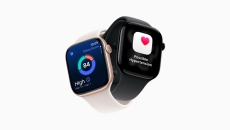Operations
Kari O'Rourke, president of Imagine Pediatrics, says providers can reduce ER visits and costs by wrapping care around the whole family, unifying fragmented records with technology and addressing child patients' social needs.
According to Dr. David K. Butler, Epic emeritus CMIO and clinical informatics leader at Calyx Partners, securing buy-in from clinicians and staff, tracking training and budgeting for post-go-live optimization are essential for lasting EHR adoption.
The AirPods Pro 3 will include heart rate sensing, while the Watch Series 11 will come with hypertension detection and a new sleep score.
Jonathan Harris, president and incoming CEO of Owlet, discusses the company's newest baby monitoring offerings with MobiHealthNews.
NYU Langone Health System's Dr. Jonah Feldman says agentic AI can strengthen patient-physician relationships by helping patients prepare discussion topics and offering ongoing support between appointments.
While shorter-term fixes like renegotiating payer contracts can help, Wipfli's Kelly Arduino recommends that hospitals heavily dependent on Medicaid rebuild community philanthropy and endowments.
Dr. Ethan Goh of the Stanford ARISE Network says researchers are testing AI's ability to mirror a doctor's diagnostic thought process, which could lay the groundwork for deploying safe, trusted AI in clinical care.
Matt Koehler, VP of product innovation at Surescripts, describes a scenario, which was presented at AHIP 2025, where prior auth can be completed in 30 seconds using coordination between the physician, PBM and EHR.
Anne Snowdon, chief scientific research officer at HIMSS, says while there are many reasons why AI is more readily adopted by other sectors, the central one is that in healthcare, lives are at stake.
John Yount, chief innovation officer at FinThrive, discusses ways AI can eliminate inefficiencies and better reduce revenue leakage that typically stem from errors, delays and missed opportunities for reimbursement.









